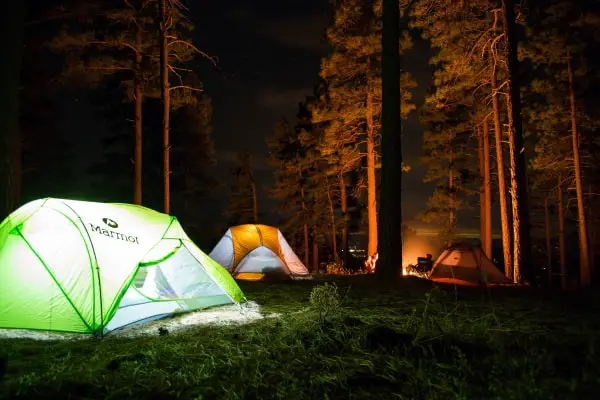
While most of today’s outdoor companies are making nylon tents, there are still many tents today that are made from canvas. Some people swear by nylon and the myriad of nylon blends while others are die-hard fans of canvas tents.
So who wins in the battle of canvas tents vs nylon tents? Nylon tents are better for backpackers and campers while canvas tents can sometimes be better for long-term base camps of a more permanent nature. The reason for this is that nylon tents tend to be lighter than canvas tents and canvas tents tend to be more durable than nylon tents.
Of course, these aren’t the only differences between canvas tents and nylon tents. There are many reasons why somebody might want to choose one over the other and we’ll cover these in the rest of this post.
I’ll also go over the history and the properties of canvas tents and nylon tents in detail but if you want to skip those sections, you can easily do so by using the table of contents below.
Table of Contents
Canvas Tents – A Brief History
Historically, canvas tents were made from linen. This material is made from tightly wrapped cotton and it replaced the traditional tents that were made from animal hides.
Before the advent of modern machinery, these tents took a lot of work to make. This changed during the industrial revolution and the canvas tent entered its golden age.
Canvas tents ended up being used in hunting camps, gold mining camps, and on military bases. They even ended up housing many people during poor economic times like the Great Depression.
Eventually, canvas tents would become synonymous with the circus. Each year, millions of people would find entertainment under “The Big Top”.
These days, canvas tents are often made from blends of cotton and polyester and they’re mostly used to make large camping tents for base camps, for luxury glamping setups, and on homesteads. You may also see them at big events like outdoor weddings and car shows.
The Advantages of Canvas Tents
Canvas tents offer many advantages and it’s probably why they’ve been around for so long.
Here are 9 advantages of canvas tents that you can benefit from.
- Canvas tents are incredibly durable and easy to repair.
- Canvas tents are often made from natural and sustainable materials.
- A canvas tent can save you money.
- Canvas tents don’t drip when they’re on fire.
- Tent stoves can be used in canvas tents.
- Canvas tents breathe better than other tents.
- Canvas tents offer better protection from the elements.
- Canvas tents offer better noise control.
- A canvas tent can offer a luxury feel.
Canvas Tents are Durable
Canvas tents are known for their durability. The main reason for this is that these tents are thick and tightly woven. Because of this, it’s hard to rip, tear, or puncture a canvas tent.
Also, when a canvas tent is torn, it is usually easy to repair. Repair kits are easy to work with and the canvas is much more forgiving when sewing than a nylon tent.
Canvas Tents are Better for the Environment
Canvas is made from cotton, which is a natural and sustainable product.
Nylon, on the other hand, is created using carbon-based chemicals. This is generally petroleum but coal could be used as well.
Also, because canvas tents last so much longer than other types of tents, they don’t have to be created as often. You’ll be doing the environment and your bank account a favor just by not replacing your tent as often.
When you do finally send your canvas tent to the grave, it will biodegrade. A petroleum-based tent material will not.
Canvas Tents Can Save You Money
As I just alluded to in the last section, a canvas tent can save you money. The main reason for this is because they last longer than nylon tents.
While you might pay more for a canvas tent up front, you’ll end up saving money in the long run.
Canvas Tents Burn Differently Than Nylon Tents
A canvas tent may burn faster than a nylon tent but at least it won’t drip on you. Nylon melts when it catches fire and this can result in the material dripping down onto you. In some instances, this can make a fire even more dangerous in a nylon tent.
Here is a video that shows exactly what happens to nylon when it’s exposed to fire.
Tent Stoves and Canvas Tents
Many large canvas tents are built with a tent stove in mind. What this means is that there is a section with a cut-out for a stove pipe.
Even if there isn’t a pre-made stove jack pipe hole in the tent, you can easily add one yourself. Canvas tent material is thicker than most nylon tents so it’s easier to work with and less likely to tear while you’re cutting it.
Once the tent stove is in place, you’ll find that your canvas tent will hold the heat in more efficiently than a nylon tent too. This is simply because it’s thicker and this thickness offers better insulation.
Canvas Tents Breathe
Canvas materials breathe better than nylon. The main advantage of this is that you’re less likely to have condensation inside of a thick canvas tent when compared to a nylon tent of similar thickness.
If you aren’t well-versed on what this means, take a look at my post titled, “Why Does the Inside of My Tent Get Wet“.
Another advantage comes in the form of odor control. A canvas tent is less likely to hold odors compared to a nylon tent.
Canvas Tents and the Weather
Canvas tents are generally thicker than nylon tents. As a result, they have better-insulating properties when compared to nylon tents.
This doesn’t just apply to the inside of the tent either. The thick materials used to make canvas tents help slow down the rate at which the sun heats up the tent during the day time. This means you’ll be able to sleep in a little longer while summer camping in a canvas tent versus a nylon tent.
Canvas Tents Reduce Noise
A canvas tent is going to let less noise into your tent and it’s going to let less noise out of your tent. This makes it an ideal tent for crowded car camping sites and large base camps.
As a result of the reduced noise levels, you won’t have to worry about going to bed at the same time as everyone else in camp. Want to stay up late and watch movies on your tablet? No problem. Want to go to bed early without having to listen to your neighbors talk all night? In a canvas tent, that shouldn’t be a problem either.
Canvas Tents Offer Luxury Camping
Have you ever seen a glamping tent made from nylon? Me neither.
Glamping tents are almost always made from canvas. This is because only a canvas tent can provide the luxury qualities that glamping tent campers look for.

The Disadvantages of Canvas Tents
Canvas tents are no longer the only game in town and we’ve seen nylon tents replace them in most areas.
You’ll find the reasons for this in these 7 disadvantages of canvas tents.
- A canvas tent has a higher initial cost when compared to other types of tents.
- Canvas tents are heavier and bulkier than other tents.
- It usually takes more work to set up a canvas tent.
- Canvas tents can require more maintenance than nylon tents.
- You might not be able to find a small canvas tent.
- Mold, mildew, and rot can become an issue for canvas tents.
- Canvas tents need to be seasoned.
Canvas Tents Cost More
While a canvas tent may last longer and cost less to repair, it will cost you more money upfront to buy. Sometimes the difference in price can be quite significant.
For instance, a 10′ x 10′ Kodiak canvas tent is going to cost you around $500.00 while a 10′ x 10′ nylon tent from Mountain Trails might only cost you $100.00.
Canvas Tents are Heavy
A canvas tent is going to weigh more than a nylon tent. On top of this, the tent poles are probably going to have to weigh more as well.
Additionally, a canvas tent doesn’t fold up as neatly as a nylon tent. Combine this with its heavier weight and you’ll find that a canvas tent is one of the worst options for backpacking.
Canvas Tents Require More Setup
The bulk and weight of a canvas tent make it more difficult to set up. Bring a canvas tent with you on your trip and you’ll end up spending more time getting your tent up than you would if you had taken a nylon tent instead.
While this might not be a big deal for long trips, it can dramatically decrease the camping experience on shorter trips.
Canvas Tents Require More Maintenance
A canvas tent is not naturally waterproof. This means you’ll spend some time each season testing your waterproofing agents or adding more waterproofing agents to the tent.
Cleaning the tent can also be a little more difficult as soaps and detergents can ruin any water-repellent treatments that you’ve applied to the tent.
Canvas Tents are Big
Nylon dominates the backpacking tent scene and you’ll be hard-pressed to find a small canvas tent that you can backpack with.
This isn’t just a problem for backpackers either. Sometimes car campers just want a small tent that they can quickly and easily set up and that won’t take up a lot of space in their vehicle. If you’re one of these campers, a canvas tent probably isn’t for you.
Canvas Tents Can Rot
Canvas tents are prone to rotting. They’re also prone to collecting mold and mildew.
For these reasons, canvas tents must be fully dried out before they’re put away. This can be a real challenge for apartment dwellers who need to break camp before their tent is fully dry. Reason-being, they won’t be able to come home and open their tent out on their lawn until it dries.
Canvas Tents Need to Be Seasoned
Before you can even use a canvas tent, it needs to be seasoned. What this means is that you need to expose your tent to water. This allows the tent material to swell with the water and then seal itself as it dries out.
Again, this won’t really be a big issue for people with backyards but it could be a real problem for people without them. Fail to season your tent before your first time out in the rain and you could end up having to sleep in a leaky tent.
Nylon Tents – General Overview
While nylon has been around since the 1930s, it wasn’t until the 1970s that it became a popular tent material. Since then, people have used it to climb Mt. Everest, to complete the Triple Crown of backpacking, and for more humble pursuits like a weekend of car camping with the family.
These days it can be difficult to find a tent made purely of nylon but you’ll find many nylon blend tents.
Polyester/nylon blends are quite popular and so are silicone/nylon blends. Silicone/nylon blends are often referred to as silnylon and polyester/nylon blends are referred to as poly nylon.
There are pros and cons of the different blends but we’ll focus more on the nylon part in the rest of this section.
The Advantages of Nylon Tents
- A nylon tent can be extremely lightweight.
- Nylon tents are more compact than canvas tents.
- Nylon tents don’t burn as quickly as canvas tents.
- Nylon tents are easier to waterproof.
- Nylon tents dry quickly.
- A nylon tent needs less maintenance than a canvas tent.
- Nylon tents are inexpensive.
Nylon Tents Don’t Weigh Much
Nylon tents have a serious weight advantage over canvas tents.
Remember the two 10′ x 10′ tents I mentioned earlier? The canvas one weighs in at about 70 pounds while the nylon one weighs in at about 15 pounds.
Nylon Tents Are Compact
A nylon tent breaks down into a much smaller package compared to a canvas tent. This means it will take up less room in your backpack, in your vehicle, and in your house.
Nylon Tents Don’t Burn as Easily
While it’s true that nylon tents melt, they don’t burn as easily as canvas tents. When an ember hits a nylon tent, it’s more likely to melt and go out rather than burn.
Of course, this isn’t to say a nylon tent won’t catch fire. These tents do catch fire, it’s just that they catch fire less easily than canvas tents.
Interested in preventing tent fires? Check out my post titled, “Are Tents Fire Resistant“.
Nylon Tents are Easily Waterproofed
Nylon is not naturally waterproof. It is naturally water-resistant but will eventually absorb water, sag, and ultimately leak.
However, nylon tents are easy to waterproof. You don’t have to season a nylon tent like you do to make a canvas tent waterproof.
Instead of seasoning the tent, you simply apply a waterproofing substance to the tent and a seam sealant to the tent’s seams.
Nylon Tents Dry Quickly
Nylon tents dry a lot more quickly than canvas tents. This is a result of it being thinner as well as the fact that it’s made with a looser weave than canvas.
When I lived in an apartment, I found this quality invaluable. After coming home from a rainy camping trip, I could just air dry my backpacking tent out on my apartment patio. It dried so quickly that I was always able to get it out there, get it dry, and get it back inside before anybody ever complained about it.
Nylon Tents Are Low Maintenance
Nylon tents are resistant to mold and mildew and they’re unlikely to rot. They’re also quicker and easier to clean.
To maintain a nylon tent, you just need to dry it out before you put it away, apply water-repellents to it, and store it properly.
The same can be said of a canvas tent but they’re harder to dry out and harder to store.
Nylon Tents Cost Less Than Canvas Tents
A nylon tent is often much less expensive than a canvas tent. For the price of a canvas tent, you might be able to buy two, three, or even four tents made from nylon.
The Disadvantages of Nylon Tents
- Nylon tents can sag when wet.
- A nylon tent will often have more condensation than a canvas tent.
- Nylon tents melt when they catch fire.
- You won’t get as much privacy from a nylon tent.
- Stoves shouldn’t be used inside nylon tents.
- A nylon tent isn’t as durable.
- Nylon is a petroleum-based product.
Nylon Tents Sag When Wet
A canvas tent will swell with water but it will keep its shape. Nylon tents, on the other hand, will absorb water and eventually sag.
This can make an already uncomfortable situation even worse. Not only will you be getting rained on inside of your tent, but the tent will be closer to your head so you’ll have less room inside.
Luckily, you can defeat this disadvantage simply by making sure you have waterproofed your tent properly. Alternatively, you could get a rain fly to put over your tent so that you won’t have to worry about the water gaining access to your tent’s rooftop.
Nylon Tets Melt In Fire
As we mentioned earlier, a nylon tent will melt when exposed to fire. This can lead to dripping and it can cause a tent fire to spread more quickly.
It can also lead to a disastrous situation where the tent has dripped onto you and you’ve suffered burns before you’ve even had the chance to attempt an escape from your burning tent.
Nylon Tents Don’t Offer Much Privacy
A well-lit nylon tent can easily be seen through. This same tent can also easily be heard through as well.
The reason for this is that nylon tents just aren’t thick enough to provide any tangible sort of privacy. They’ll keep people from seeing you naked but that is about all they’ll do.
A Nylon Tent Doesn’t Go Well With Camping Stoves
Expose nylon to too much heat and it will melt. Hit it with an ember and it will also melt and potentially ignite.
Neither of the above attributes goes well with a tent stove.
Nylon Tents Aren’t As Durable As Canvas Tents
A nylon tent is more susceptible to tears, rips, and holes. Set a nylon tent up on sharp rocks or tree branches and you’ll probably end up having to repair it afterward.
Luckily, these repairs can often be avoided just by cleaning up your campsite before you set your tent up. Add in a thick tent footprint and you should be able to keep the bottom of your tent safe from punctures.
On the other hand, if you’ve decided to go camping with your dog or cat, you’ll probably be better off with a thick canvas tent instead.
Nylon Is A Petroleum-Based Product
Nylon can’t be sourced naturally and it’s a non-renewable product. This material isn’t biodegradable either.
Some people will see this as a disadvantage and some people won’t care. I view this fact as a disadvantage, but ultimately this website wasn’t designed to sway you either way.
Summing It All Up
Nylon tents are lightweight and inexpensive which makes them great for backpacking and short car camping trips. Canvas tents are durable and more comfortable to sleep in which makes them great for base camps and longer car camping trips.

